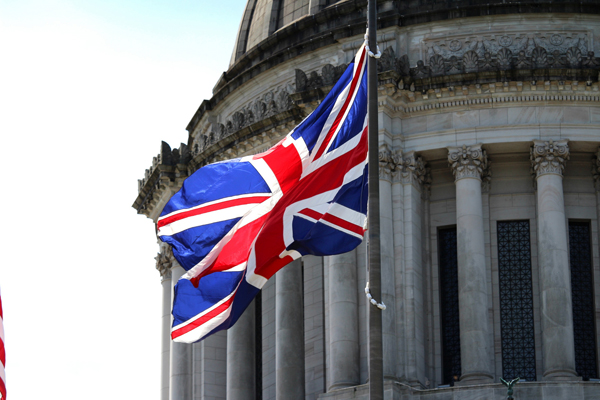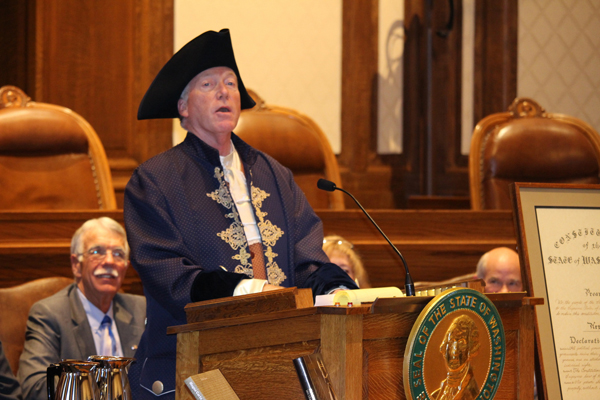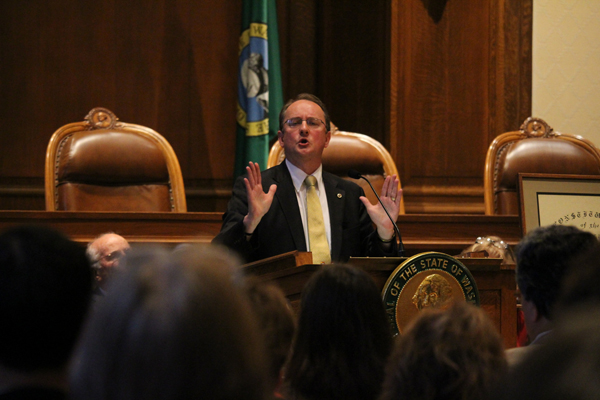WA honors Magna Carta’s 800-year legacy of liberty
British flag flies outside Capitol. (Photos courtesy of Benjamin Helle)
As the Union Jack flew at the Washington state Capitol and inside the ornate Temple of Justice, the state joined a national and international celebration of the 800-year legacy of liberty and the rule of law.
The foundational document was described as “the most famous and pivotal law document in the world” by Robin Twyman, UK consul in Seattle. Robert Stacey, an expert on early British history, said American colonists took the often-forgotten Great Charter and ran with it, famously rebelling against “taxation without representation” and demanding the rule of law and the consent of the governed.
Allen Miller takes on the role of Thomas Jefferson.
Even Thomas Jefferson put in an appearance! At precisely 12:15 p.m. Monday — for the year 1215, when King John sealed the document to quell a rebellion — bells were rung and “huzzahs” shouted. Re-enactor Allen Miller as Jefferson read the “Free Man Clause” on the due process of law. Jefferson and the founders relied on themes from the Magna Carta in writing the Declaration of Independence and U.S. Constitution.
Retired Supreme Court Chief Justice Gerry Alexander, co-chair of the organizing committee, called the charter “the greatest constitutional document of its time… that has served as the foundation of freedom against the authority of despots.” He traced its impact on American law, including “the rights we often take for granted.”
Twyman said the symbolic moment of a king submitting to the rule of law is an enduring concept, even if the Charter itself has mostly been discarded. “Thus was born the legacy of law and liberty,” he said. Some of the great social justice movements, including those by Mandela and Gandhi, have drawn on that legacy. The charter was “no silver bullet, no Big Bang moment,” but was the beginning of an evolution that bent the arc of history, he said.
Robert Stacey, a UW history professor, discusses the history of the Magna Carta.
Stacey, history professor at the University of Washington and dean of the College of Arts and Sciences, traced the long and checkered history of the Magna Carta in the UK. He said the charter was a political document in England, but a foundational legal document in America.
“It is a symbol of good government … and sank deeper roots in America” at the intersection of taxation, representation and consent, and rebellion, Stacey said. “It mattered more to the U.S. than to England. … The debt the American judicial system owes to Magna Carta is significant.”
Justice Charles Wiggins said the core concepts are “strangely modern” still and arise in many of today’s legal cases.
Olympia High School student Gabrielle Sipe drew a standing ovation for her dramatic recitation of Rudyard Kipling’s “What Say the Reeds at Runnymede?”
The event co-chair was Sue Lean, Olympia historical exhibit designer. The celebration was sponsored by the Washington Courts Historical Society and supported by Secretary of State Kim Wyman, the State Archives, Washington State Arts Commission, Washington State Historical Society and the Thurston County Courts History Committee.
The National Association of Secretaries of State, the American Bar Association, and others are promoting a year-long celebration. The United Kingdom staged an elaborate three-day commemoration, with Queen Elizabeth II attending Monday’s program.


